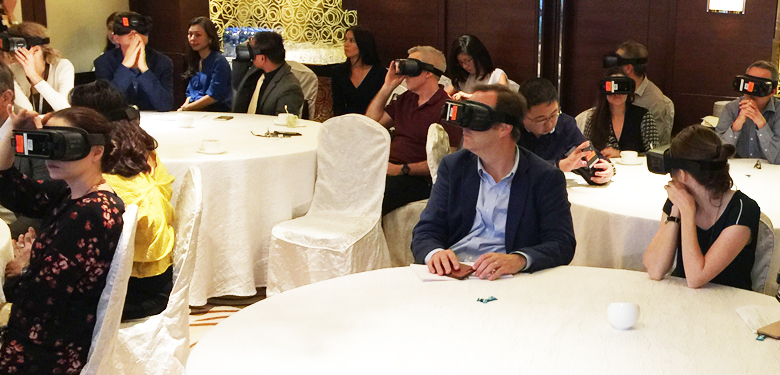Virtual reality – The empathy machine driving CSR and sustainability agendas?
Companies are progressing from mere compliance-driven corporate social responsibility (CSR) approaches to becoming advocates for global issues. In doing so they face new challenges in educating and engaging consumers on complex issues and corporate strategies. To assert influence and effect change, companies are increasingly required to build immediate and deep connections with customers, employees, investors, policy makers and other key stakeholders. This is where virtual reality (VR) provides promising applications.
VR refers to any visual representation of a 3D virtual world, mostly through 360-degree videos, but is most commonly associated with head-mounted display systems that deliver images to the eyes from two individual lenses, thus visually separating viewers from their actual environment with varying levels of interactivity.
Routinely associated with gaming and entertainment, VR technology is rapidly becoming an effective tool to foster social impact by helping share experiences and perspectives through immersive storytelling.
The underlying notion is that by immersing users into, say, far-flung endangered habitats or a home in an unfamiliar environment, VR helps build awareness, emotional connections and empathy; breaking down prejudice and inspiring people to act.
Here are some exciting examples of businesses and non-profit organisations combining VR technology with powerful content to drive fundraising, advocacy, and supply chain transparency.
VR to encourage policy action and raise funds
With UNVR, a project by the UNSDG Action Campaign, the UN has created and deployed a series of VR films to raise awareness and funds to tackle real-world problems such as climate change and the Syrian refugee crisis.
Initially developed to engage global leaders and encourage policy actions, the films were screened at diplomatic forums such as the Secretary-General’s International Ebola Recovery Conference in 2015. They quickly proved to be effective fundraising tools, too.
At the Third International Humanitarian Pledging Conference for Syria in 2015, “Clouds Over Sidra” a VR mini-documentary following a 12-year-old Syrian refugee was shown to top donors and decision makers. The resulting pledges surpassed projections by USD 1.6 billion, bringing in USD 3.8 billion, a 46% increase on the previous year.
The impact of VR on fundraising has also been significant for UNICEF. Through UNICEF 360°, users can view “Clouds over Sidra” and other VR videos using the UNICEF 360° smartphone app and a UNICEF-branded cardboard viewer. The children’s rights and emergency relief organisation has benefited from the technology particularly in face-to-face fundraising campaigns for which VR has proven to increase the propensity to stop and engage, increase the inclination to donate after engagement and also led to an increased average donation value.
VR to engage customers
Fairtrade Denmark in partnership with Danish coffee roasting company, Peter Larsen Kaffe, produced a VR video about a coffee farmer and his family in Kenya. Narrated by the farmer himself, the award-winning VR film allows consumers to “experience the amount work and love that goes into every single coffee berry” and thus creates understanding of the livelihoods supported through Fairtrade products.
The Fairtrade Foundation uses the video at global scale to engage and educate consumers and the broader public. Its website sells simple VR headsets to be used with smartphones and provides a primary school lesson plan, which incorporates the video, to provide educators a tool to build understanding among children.
TOMS Virtual Giving Trip is another example of engaging customers in a behind-the-scenes virtual tour of how their purchases support charitable causes. In 2015, retail customers at selected TOMS stores were able to don Samsung Gear VR goggles to virtually participate in the donation of shoes at a school in Peru.
VR to provide a perspective on harmful drinking
Global leader in alcohol beverage, Diageo, launched a VR film series that immerses consumers in an interactive first-person story about the dangers of drunk driving and binge drinking. Diageo’s second VR film “Decisions: Party’s Over” allows consumers to interact with the story – switching between four different points of view, users can experience the perspective of different characters in the story. Diageo North America’s Chief Marketing and Innovation Officer, James Thompson, stated that their hope was, “…to reach our audience on an emotional level and prevent future detrimental impaired decisions associated with binge drinking.”
VR to increase supply chain transparency and address modern slavery
In response to customer inquiries about the social and environmental impact of the company’s supply chain, Dell developed a series of 360-degree videos which provided on its supply chain website complement Dell’s supply chain reports and annual customer in-person tours of facilities.
The VR videos, produced during actual customer visits to supplier facilities, allow viewers to look around an actual supplier factory, see the living conditions for workers at the factory and observe an engagement session in which customers participating in a factory tour directly asked workers about their living and working conditions.
In collaboration with immersive technology and content developers and leading producers of food products, the University of Sydney is developing an interactive VR tool to shed light on the realities of modern slavery in global supply chains and opportunities for positive change. Targeted at businesses and consumers, the tool will demonstrate the direct impact business decisions and consumer choices have on modern slavery.
Virtual reality has the potential to transform how companies tell their sustainability story and engage stakeholders. It holds great promise for educational marketing campaigns that convey brand values and corporate sustainability commitments in ways that attract customer attention and can affect customer behaviour. More importantly, it can help companies shed light on complex challenges within their broader value chain that require action at global scale by multiple stakeholders.
To learn more about how VR and other technology trends define the future of CSR, join us on 18-19 September at the CSR Asia Summit 2018 in Hong Kong!
